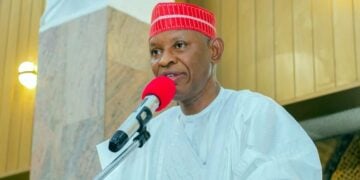In a bid to promote African fashion globally, renowned fashion expert, Miss Adebukunola Mobolaji Olukoya, co-founder, Love Your Own Nigerian Style, LYONS, has called upon governments across the continent to invest in and support the African fashion industry.
In a statement personally signed by her, Olukoya argued that with the right support, the African fashion industry can not only contribute to economic growth but also provide a platform for cultural exchange and empowerment.
The statement partly reads: “Government support for the African fashion industry is not a luxury; it’s a necessity. We are blessed with a rich tapestry of culture and craftsmanship, and it’s time for us to unlock its full potential. Africa’s fashion industry has the capacity to drive economic growth, create jobs, and elevate our global presence. This is why government support is pivotal.”
Miss Olukoya emphasizes the need for African leaders to become brand ambassadors for African fashion.
“Their influence extends far and wide, presenting an unparalleled opportunity to showcase the continent’s unique identity.
African leaders should wear Africa wherever they go, promoting our fashion and culture on the global stage. When they don African attire, they send a powerful message of unity and pride. It’s a symbol of their commitment to preserving our heritage and supporting the growth of our fashion industry,” she asserts.
Speaking on encouraging Diaspora Engagement, she said: “The African diaspora is a significant audience for African fashion. Miss Olukoya encourages African governments to engage this community and promote a strong connection with their roots through fashion.
“We must engage the African diaspora to join us in celebrating African fashion. Governments can facilitate cultural exchange programs, encouraging the diaspora to embrace their heritage and wear African clothing. Let’s build bridges that connect us to our brothers and sisters across the world.”
On Tax Breaks for African Fashion Businesses, Miss Olukoya underscores the importance of tax incentives for African fashion businesses. Lowering the tax burden can alleviate financial strain and encourage further investment in the industry.
“Tax breaks for African fashion businesses will free up capital that can be reinvested in creative processes, marketing, and expansion. This not only benefits entrepreneurs but also fuels economic growth and job creation,” she emphasizes.
“Low-Interest Loans for African Fashion Entrepreneurs: Access to affordable capital remains a challenge for many African fashion entrepreneurs. Miss Olukoya advocates for low-interest loans to stimulate innovation and entrepreneurial growth.
“Low-interest loans can provide the much-needed capital for emerging designers and businesses in the fashion sector. These investments will yield returns in the form of job creation and a more competitive African fashion industry,” she added.
Stressing on making native attire mandatory for government Offices, Miss Olukoya envisions a government decree that would encourage all government offices to embrace native attire, a move that would stimulate the fashion industry and generate numerous job opportunities.
“Imagine if all government offices were mandated to wear native attires at least once a week. The impact on our industry would be profound. The demand for African fashion would surge, leading to job creation at every level, from designers and tailors to textile manufacturers,” she suggested.





